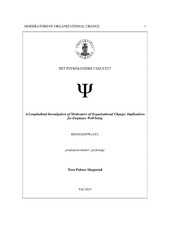| dc.contributor.author | Skagestad, Tora Palmer | |
| dc.date.accessioned | 2015-06-16T08:47:29Z | |
| dc.date.available | 2015-06-16T08:47:29Z | |
| dc.date.issued | 2015-04-15 | |
| dc.date.submitted | 2015-04-15 | eng |
| dc.identifier.uri | https://hdl.handle.net/1956/9985 | |
| dc.description.abstract | The negative impact of organizational change upon employee well-being is well established, however, studies on possible moderators of this relationship are scarce. Therefore, the aim of this longitudinal research was to test the possible buffering effects of participation in decision making and change-centered leadership style, on the relationship of organizational change and employee job satisfaction and depression. Moderated hierarchical regression analyses (N =2539) revealed lagged main effects of organizational change on employee job satisfaction and depression. Time 1 organizational change was positively related to Time 2 depression (.06 β ; p =.00) and negatively related to Time 2 job satisfaction (-.05 β ; p = 0.3) . Results did not support the buffering effects of participation in decision- making and change-centered leadership style. However, there was an interaction between organizational change and a change- centered leadership style (β= -.073, p=.004). It was found that employees exposed to high levels of organization change and change-centered leadership had a decrease in job satisfaction over time. Overall, the results suggest that organizational change has a negative effect upon employee well-being over time, and that a change-centered leadership style is negative for employee job satisfaction during a high degree of organizational changes. | en_US |
| dc.description.abstract | Den negative innvirkningen organisasjons endringer har på ansattes velvære er vel etablert, mulige moderatorer av dette forholdet er derimot lite studert. Målet med denne survey undersøkelsen var derfor å teste en mulig beskyttende effekt av medbestemmelse og endringsorientert lederstil, på forholdet mellom organ isasjonsendring og ansattes jobbtrivsel og depresjon. Den modererte hierarkiske regresjonsanalysen (N=2539) viste en hovedeffekt av organisajonsendring på jobbtrivsel og depresjon over tid. Organisajonsendring T1 var positivt relatert til depresjon T2 (.06 β ; p = .00), og negativt relatert til jobbtrivsel T2 (-.05 β; p = 0.3). Resultatene støttet ikke en beskyttende effekt av medbestemmelse og endringsorientert lederstil. Det var derimot en interaksjon mellom organisajonsendring og endringsorientert lederstil i en negativ retning (β=-.073, p=.004). Ansatte som var eksponert for en høy grad av endringer og hadde en leder som var endringsorientert, viste en nedgang i jobbtrivsel over tid. Disse resultatene indikerer at organisajonsendring har en negativ effekt på ansattes velvære over tid, og at en endringsorientert ledelsestil er negativt for ansattes jobtrivsel under en høy grad av organisajonsendringer. | en_US |
| dc.format.extent | 589440 bytes | eng |
| dc.format.mimetype | application/pdf | eng |
| dc.language.iso | eng | eng |
| dc.publisher | The University of Bergen | eng |
| dc.rights | Copyright the Author. All rights reserved | eng |
| dc.subject | Job Satisfaction | |
| dc.subject | Organizational Change | |
| dc.title | A longitudinal investigation of moderators of organizational change: Implications for employee well-being | eng |
| dc.type | Master thesis | |
| dc.description.localcode | PSYK300 | |
| dc.description.localcode | PRPSYK | |
| dc.subject.nus | 736102 | eng |
| dc.subject.nsi | organisasjonsendringer | eng |
| dc.subject.nsi | longitudinelt | eng |
| dc.subject.nsi | moderatorer | eng |
| dc.subject.nsi | mental helse | eng |
| dc.subject.nsi | endringsorientert lederstil | eng |
| dc.subject.nsi | longitudinal | eng |
| dc.subject.nsi | moderators | eng |
| dc.subject.nsi | employee wellbeing | eng |
| dc.subject.nsi | change - centered leadership | eng |
| fs.subjectcode | PSYK300 | |
